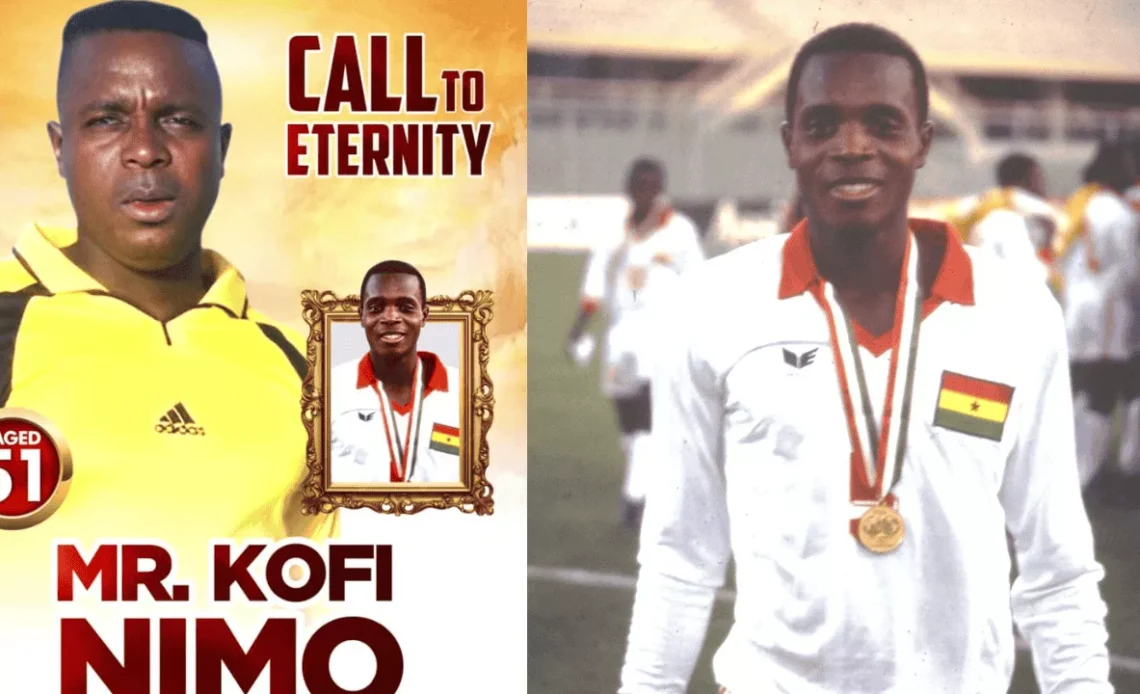
- Former Ghana U-17 World Cup winner Kofi Nimo died on September 3, 2025, aged 51, after a long illness.
- Ridge Hospital has reportedly withheld his body due to unpaid medical bills.
- His family, led by his son, has been appealing for help to retrieve the body for burial.
- Attempts to get assistance from GFA officials and former players have been unsuccessful so far.
- Only the Professional Footballers Association of Ghana (PFAG) has provided financial support.
- The family is calling on Ghanaians and football authorities to assist in giving him a decent burial.
The family of late Ghana U-17 football hero Kofi Nimo is in anguish as the Ridge Hospital in Accra has reportedly refused to release his body due to unsettled medical expenses.
Nimo, remembered as one of the solid defenders in Ghana’s historic 1991 Black Starlets team that won the nation’s first-ever FIFA U-17 World Cup, passed away on September 3, 2025, after battling illness for several months. His death, though mourned by many, has now been overshadowed by the painful reality that his remains are being kept in the hospital morgue over debts his family cannot clear.
According to his son, who has been leading the family’s efforts, attempts to reach out for assistance have yielded little success. He reportedly contacted officials of the Ghana Football Association (GFA) and former football colleagues, hoping for a helping hand, but the responses have been discouraging. So far, only the Professional Footballers Association of Ghana (PFAG) has extended a small donation to support the family.
“We just want to bury our father with dignity,” the grieving son shared, expressing frustration over the situation.
Once a national hero who helped lift Ghana’s flag high on the global stage, Kofi Nimo’s final chapter has turned into a struggle his family never imagined — a painful reminder of how fleeting fame and recognition can be in Ghanaian sports. The family is now appealing to well-meaning individuals, the football fraternity, and the general public to help them raise funds to settle the hospital debt and lay him to rest.
Kofi Nimo’s story exposes a troubling truth about the fragile support system for retired athletes in Ghana — a system that celebrates heroes in their prime but often forgets them when the cheers fade. Here was a man who represented the nation on one of the biggest stages in football history, contributing to a legacy that inspired generations of young talents. Yet, decades later, his family now faces the unbearable pain of not being able to retrieve his body from the hospital that treated him.
This is not just a family tragedy; it’s a national failure. The football community — from the GFA to former players and sports administrators — bears a collective responsibility to ensure that those who once carried the nation’s pride are not left to suffer indignity in death. The fact that a World Cup-winning player’s family is forced to publicly beg for assistance to bury him should spark serious reflection about welfare policies for ex-players.
The Professional Footballers Association of Ghana (PFAG) has made an effort, but isolated acts of kindness are not enough. There should be structured support — a retirement or medical relief fund — that can be accessed by former athletes who fall on hard times. Beyond financial aid, Ghana must also reexamine how it preserves and honors the memories of its sporting icons.
Kofi Nimo’s passing should not only evoke sympathy but also stir reform. His life and death remind us that the glory of national representation should not end in neglect. If Ghana truly values the men and women who give their youth to sport, then the nation must prove it — not just in moments of victory, but especially in times of need.